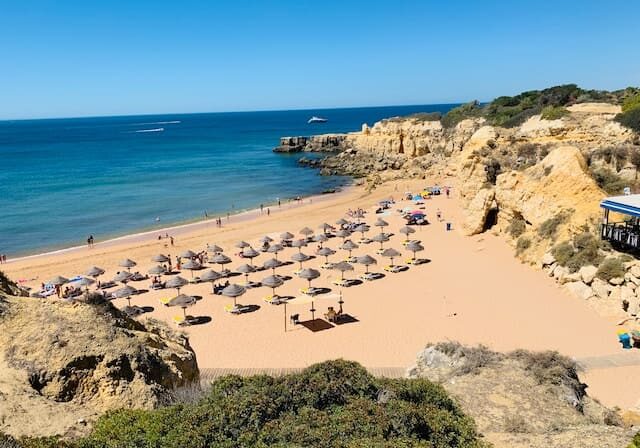Updated: April 23, 2024
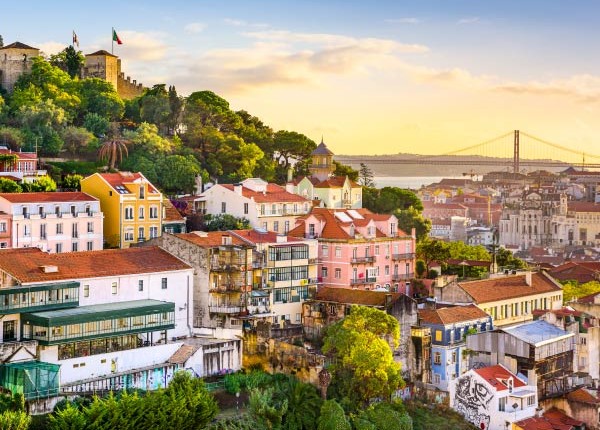
Portuguese life offers an array of perks – Portugal is considered in many ways the best country to live in – and US citizens are increasing in number, finding the country to be the perfect place to call home.
If you’re looking to visit Portugal, are thinking of relocating, or are curious about why Portugal is so popular among American expats – or British citizens and other foreign nationals, for that matter – keep reading to find out more about living in Portugal.
Why Expats Are Living in Portugal
While the cost of living in Portugal is relatively low for Americans, expats aren’t pulled in by financial reasons alone. With over 300 days of sunshine each year, beautiful landscapes, and friendly locals, Americans come to love the vibrant local culture of this Western European Union (EU) country.
Factor in good food found in traditional Portuguese restaurants, beautiful beaches, and a laid-back lifestyle in Southern Europe, plus the fact that Portuguese people speak English, and Portugal becomes a firm favorite – indeed, moving to Portugal as an American is, for many, as good as it gets.
The Best Places to Live in Portugal as an Expat
From affordable city life or luxury living to historic towns and breathtaking beach houses along the Atlantic Ocean, expat life in Portugal provides you with an array of stunning locations and property types. American expats tend to favor the urban areas of mainland Portugal – Lisbon and Porto – when looking for the best neighborhoods in Portugal to live in. Although, the Algarve region, with a growing tourism sector, is also increasing in popularity.
Like other European countries, Portugal is extremely safe and offers easy access to transportation links and ease of doing business and finding work opportunities as many citizens and residents in Portugal speak English. If you are moving with your family, you will find an array of top international schools, particularly in Lisbon, Porto, and the Algarve.
However, the countryside in North and Central Portugal is also becoming an excellent option for American expats looking to unwind in the beautiful Portuguese countryside. Here are some of the popular places to live in Portugal amongst Americans.
Lisbon
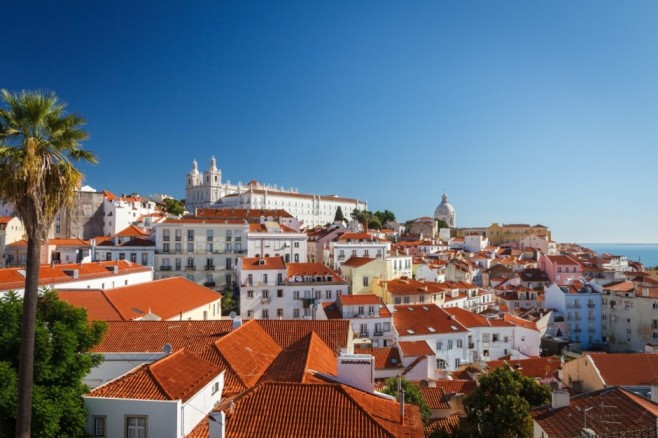
The capital is forever welcoming Americans, regardless of whether they have moved to work, study, live, or retire.
The cost of living in Lisbon is higher than in the rest of Portugal – especially when it comes to buying Lisbon real estate – although it remains affordable when compared to other European countries and major US cities. Each neighborhood has its own quirks, and choosing the right one for you will depend on your interests and what you are looking for. Are you looking for a place to move to with your family, set up a business, work as a digital nomad, or retire in a stunning European capital?
You can see our guide to the best neighborhoods in Lisbon: Best Neighborhoods in Lisbon.
You can read about Lisbon neighborhoods close to international schools for families considering moving to the Portuguese capital.
Cascais
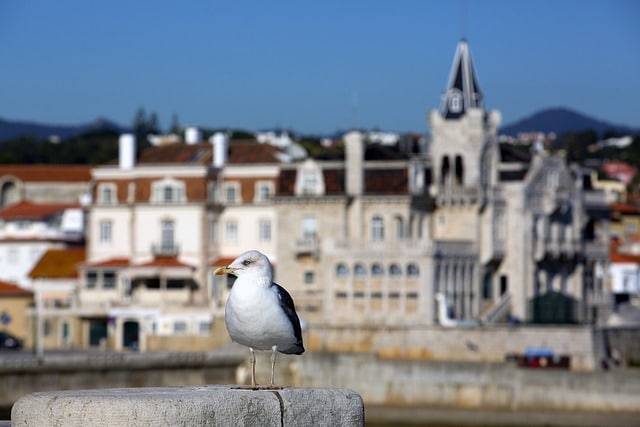
Despite having more than 200,000 inhabitants, Cascais still retains a village feel, with traditional architecture, excellent seafood restaurants, and nine golf courses close by, making it a very attractive option for Americans relocating to Portugal.
For families, Cascais real estate offers plenty of options – there are spacious mansions and waterfront villas to be found here and excellent international schools within a twenty-minute drive.
Porto
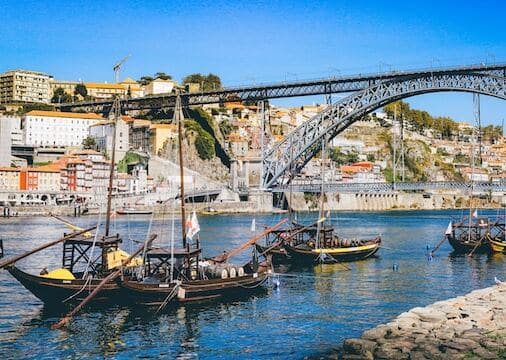
The historic city is stunning, with gorgeous beaches, local markets, activities on offer, and delicious Portuguese wine to drink.
Porto real estate is booming, and there are many excellent waterfront properties to be found here – check out the Foz Do Douro neighborhood (other excellent locations for waterfront properties in Portugal can be found in our article: Waterfront Homes in Portugal: The Best Locations).
The Algarve
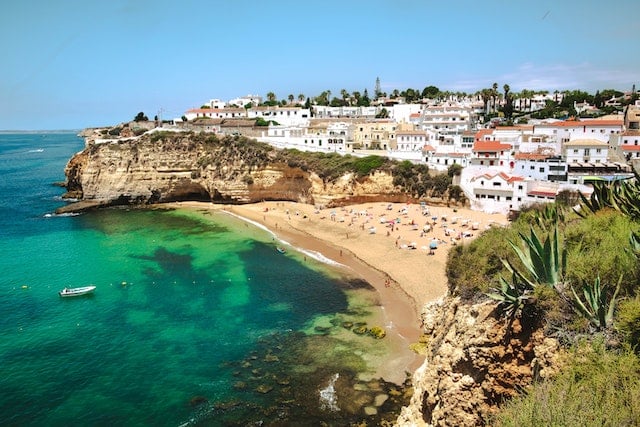
Algarve real estate is also much desired. In the Central Algarve, Vilamoura is popular amongst expats. As a resort town with a 1,000-berth marina, golf courses galore, luxury hotels, and beach clubs, it is an excellent location to consider.
It is also worth researching Albufeira, characterized by its cobblestone streets lined with restaurants and where something is always going on in the evenings. Both Vilamoura and Albufeira are conveniently close to Faro Airport, which is an added bonus for avid travelers.
Moving to Portugal

- Cost of living: Compared to the US, the cost of living in Portugal is relatively cheap, even if prices are rising in Lisbon in particular. Portugal is also affordable compared to other Mediterranean countries.
- Welcoming people: The Portuguese are renowned for their friendliness, and in general, they speak very good English. This is important for US expats looking to navigate a new country. Also, as there is a big American expat community, there is a supportive network for newcomers.
- Good healthcare system: Portugal has a very good healthcare system that extends to all legal residents. Both public and private healthcare are very affordable when compared with healthcare in the US.
- A safe and stable country: Portugal ranked as the seventh safest country in the world according to the 2023 Global Peace Index and has very low crime rates.
- Climate: Many expats move to Portugal for its pleasant climate, stunning landscapes, and pristine beaches. Temperatures rarely drop below freezing; even in winter, the sun will welcome you outside. It rarely gets extremely hot by the coast, given the cooling breeze of the Atlantic.
International schools
American families moving to Portugal may want to enroll their children in a school that teaches in English or offers a British curriculum and that offers Portuguese in addition. When looking into American schools in Portugal, you should know that there are many excellent international schools in the country, particularly in Lisbon and Porto.
Two very good options to consider in the Lisbon area are the Carlucci American International School of Lisbon and the International Schools of Cascais.
The American Embassy in Portugal
The American Embassy can be found in Lisbon for US citizens who need consular services. Note that if you are coming to the embassy for a routine matter, then you should schedule an appointment ahead of time online on the US Embassy website.
For a more urgent situation, you can go directly to US Citizen Services, then you can go to the US Embassy, located at Avenida das Forças in Sete-Rios. Take the blue line on Lisbon’s Metro to get there.
For the full list of services and more information for US citizens, you can consult the website or email [email protected].
Living in Portugal as an Expat: Pros and Cons
There are numerous advantages to living in Portugal as an expat: Warm weather, golden beaches, breathtaking scenery, a low crime rate, a relatively low cost of living, and a great quality of life. The Portugal healthcare and education systems are well-developed, and Portuguese residents can benefit from tax exemptions. Some disadvantages include the need to learn the Portuguese language and needing to carry cash on you in some situations.
 Advantages of living in Portugal (pros)
Advantages of living in Portugal (pros)
Outlined above are just a few of the advantages of moving to Portugal. Here, we’ll discuss the main advantages that attract expats from all over the world.
Warm climate
While the climate does vary from region to region, Portugal’s overall climate is quite warm. The northeast is known for long, warm summers, while the northwest is known for having more rain. Southern Portugal is known to be drier.
The warmest season in Portugal lasts from around mid-June to late September, with daily average temperatures exceeding 25 degrees Celsius (78 degrees F).
These months are also the sunniest. In Lisbon, the average daily temperature during winter is around 14 degrees C (57.2 Degrees F). If you’re looking for a snowy winter, the mountainous areas are sure to deliver.
Entertainment and recreation
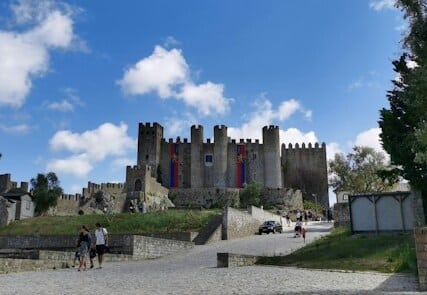
In 2020, Portugal received 26 World Travel Awards for its attractions, beaches, and resorts. The Algarve region was selected by Portuguese citizens and tourists alike as the ideal location to relax along the coast. Of all the European countries, Portugal received the title of Europe’s best tourism destination.
Safety and low crime rate
In 2023, Portugal secured the 7th position on the Global Peace Index, underscoring the country’s commitment to peace and social harmony. With a low crime rate, Portugal provides a safe haven for residents and visitors alike.
The warm hospitality of the Portuguese people adds to the appeal, creating a welcoming atmosphere for tourists and expats that have come to call Portugal their home.
By choosing this Western European country as their residence, many foreigners discover a unique combination of safety, the unique Portugal quality of life, and a rich cultural experience. This makes Portugal one of the most attractive destinations globally for both living and tourism.
The country’s charm extends beyond its peaceful environment, offering a diverse range of natural landscapes, historic cities, and a vibrant cultural scene. Whether drawn to the stunning beaches, picturesque mountains, or the renowned culinary offerings, those who make Portugal their home often find a harmonious blend of security and cultural richness in this captivating European destination.
Affordable cost of living
As with any country, the cost of living in Portugal varies depending on the area you live in and the lifestyle you lead. In general, however, the cost of living in Portugal is relatively low compared to other countries in Western Europe.
The table below will give you an idea of the average prices that make Portugal an affordable country.
Expenses | Average Price |
Dinner for two at a good restaurant | €40 |
Bread | €1.40 |
A dozen eggs | €2.76 |
Local cheese (1kg) | €9.73 |
1L of milk | €0.93 |
Apples (1kg) | €1.98 |
Cappuccino | €1.67 |
1L of petrol | €1.79 |
Utilities (electricity, water, heating, cooling, garbage) for 85 square meter apartment | 109.63 |
Unlimited internet bill | €36.47 |
Gym membership (monthly) | 35.90 |
*Numbers are estimates and can differ from city to city.
Quality education
In terms of education, Portugal offers high-quality secondary and higher education systems. In fact, degrees from Portuguese universities are recognized in the EU, making it easier for graduates looking to work in other EU countries.
Many university courses are taught in both Portuguese and English, although English courses are not available at every institution. They are also more expensive. Portugal applies the standards of the European Bologna System in its higher education system. You can read more about universities in Portugal in our article: Universities in Portugal.
Excellent healthcare

You can uncover the secrets of the Portuguese healthcare system in our easy-to-digest guide, put together by our partners, Global Citizen Solutions.
Medical care is free at public hospitals and is available to both Portuguese citizens and Portuguese residents. In healthcare clinics with private health insurance, you can benefit from a higher level of service and the ability to get appointments faster than in public hospitals.
You can also have consultations with your doctor over the phone.
There are different private health insurance policies available in Portugal, offering different packages at different prices. Most of them cover a good portion of the full cost of treatment. Americans moving to Portugal will be pleasantly surprised by the affordability of private health insurance options in Portugal.
English is widely spoken
English is widely spoken among Portuguese people, making it easy to communicate even if you are not fluent in European Portuguese.
Quality of life
Portugal is a country that offers much in the way of the pace of life. With a generally slow pace present in the country, you can still get your fix of the hustle and bustle in cities like Lisbon or enjoy a more laidback lifestyle in places like the Algarve.
 Disadvantages of living in Portugal (cons)
Disadvantages of living in Portugal (cons)
As with most countries in the world, the advantages of living there are accompanied by some disadvantages. When moving to any country, it is crucial to understand the drawbacks. Here are some of the bad things about living in Portugal.
Learning Portuguese
While the English language is widely spoken in Portugal, and most speak English, you will need to learn European Portuguese as an expat living there. Many people in government offices speak Portuguese and are not familiar with English, making it slightly harder to get things done if you or someone with you does not speak a basic level of the Portuguese language.
While this can be daunting, it’s never a bad idea to learn the official language of the country you live in. If you are to learn Portugeuse, locals usually go out of their way to assist you with mastering the language.
Cards versus cash
The Multibanco system issues bank cards in Portugal, and Visa and MasterCards are not accepted everywhere. It is advisable to, therefore, carry cash with you and check whether an international bank card is accepted. It is also recommended to open a Portuguese bank account in the first few months of moving to Portugal.
The weather
The Portuguese climate does not have extreme changes from one season to the next. It also varies between regions. Generally, winters are rainy with little snow and in summer, temperatures can rise to 40 degrees C (104 degrees F).
Lack of central heating
Apartments are generally cold inside during the winter, as there is no central heating. In order to stay warm, you will need to purchase heaters.
Bureaucracy and pace of life
Portuguese bureaucracy is a point of concern whether you’re a Portuguese citizen, a Portuguese resident, or a foreigner. Appointments can be difficult to get, applications can move slowly, and paperwork takes time. This is important to remember if you are used to a faster pace in your home country.
Portugal offers a slow pace of life that may not appeal to everyone. Local residents do not hurry and so can often be unpunctual. In keeping with the country’s culture of taking lunchtime off, shops and restaurants often close for a couple of hours in the middle of the day. In addition to this, almost all of them close on Sundays.
Living in Portugal as an Expat: How to find property in Portugal?
Moving to any country is difficult, and for Americans, there are many potential difficulties – whether it is the language barrier, navigating taxes and fees in a new country, or getting to grips with the bureaucratic system, which can be slow in Portugal.
Firstly, the Portuguese are very welcoming people and speak very good English, so the process of buying property should not be as daunting as you may assume. Secondly, it is worth having an experienced lawyer on your side, alongside a trusted financial advisor and estate agent.
A buyer’s agent is also highly recommended. At Goldcrest, we work solely for the client and provide tailored advice based on what the buyer is looking for – whether it is to retire, relocate, or invest in the country. Our network of experts in the Portuguese real estate market includes estate agents, law firms, and tax and financial advisory firms. We are an established player in the market, so please get in touch to discuss how we can work with you to secure your dream property in Portugal. You can book a call with us today.
Closing Insights: How to Move to Portugal from USA
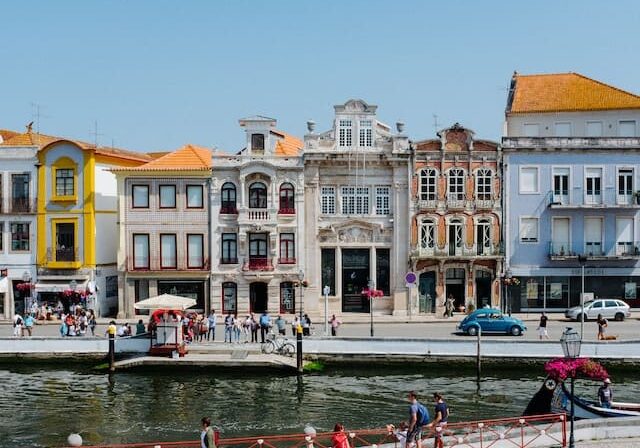
Portugal’s diverse climate caters to varied preferences, with northern regions offering an average temperature of 10-12 Degrees C (50-54 Degrees F) and the southern parts providing a warmer 16-18 Degrees C (60-65-54 Degrees F) on average.
The immigration process for foreign citizens to Portugal is notably straightforward, welcoming expats through various visa options. A few of these options include the residence by investment program, the Portugal Golden Visa, the Digital Nomad Visa (D8) for remote workers not earning Portuguese salaries and digital nomads, and the Portugal D7 Visa for retirees without Portuguese source incomes and those earning a sufficient passive income into their bank account.
With the right assistance from a migration agency or buyers agent who can help with the entire process from finding a home to purchase or rent, setting up a bank account, and translating and simplifying all the paperwork, the pathway to living in Portugal and eventually Portuguese citizenship, for entrepreneurs, skilled workers, and those pursuing a temporary stay can be easily navigated.
Whether it’s the low cost of living, the pleasant climate, or simply looking for a fresh start in a delightful country, Portugal offers non-EU citizens a vibrant expat community across regions like Algarve, Lisbon, and Porto and a welcoming home within the European Union.
Frequently Asked Questions about Living in Portugal as an American
Can Americans move to Portugal?
Can Americans move to Portugal? Yes, Americans can move to Portugal. You will need to gain temporary residence if you plan on living in Portugal for more than three months. The D7 and Digital Nomad Visa are both excellent Portuguese visa options. You can see our article on how to get Portuguese residency for more information. After five years, you can apply for a permanent residency permit and citizenship. As a Portuguese citizen with a Portuguese passport, you have access to a wide range of benefits, including increased mobility and personal freedoms.
What is the best place to live in Portugal for Americans?
Americans tend to favor urban areas, such as Lisbon and Porto. The Algarve is also a popular destination, while the Silver Coast and more rural parts of the country are picking up interest from expats.
What are the possible jobs for Americans in Portugal?
Popular types of jobs in Portugal include tourism and hospitality-related work. Tech-related jobs and customer support jobs are frequently sought after, and freelance work is increasingly common. Many international startups and tech companies moving to Portugal may also be searching for employees to help them expand their businesses.
Is Portugal a good place to live in?
Portugal is a safe country, and its residents enjoy many benefits, such as good health care, quality education, and a good quality of life. So yes, Portugal is a good place to live. There are many Portuguese visa options to secure Portuguese residency, including the Golden Visa program, the D7 Visa (also known as the Passive Income Visa), and the Digital Nomad Visa, making moving to Portugal quite straightforward.
How much money do you need to live comfortably in Portugal?
The amount of money needed to live comfortably in Portugal will depend on the area in which you live and the kind of lifestyle you lead. An individual can get by on an average salary of €1,200 per month in Portuguese cities such as Lisbon or Porto. However, this will depend greatly on your lifestyle. This amount reduces slightly in Portugal’s quieter towns.
Can I just move to Portugal?
If you are not an EU citizen, you will need to obtain a temporary stay visa and later apply for a residency visa to move to Portugal. There are different residency visa options offered by the Portuguese government to explore, such as the D7 Visa (also referred to as the Passive Income Visa) and the Portugal Golden Visa, to enable you to live in this stunning European country. For the D7 Visa, you will need to have an initial appointment with your local Portuguese Consulate or Embassy – and apply for the temporary D7 Visa from your home country – before making the move. After this, you will have an appointment with AIMA (Agency for Integration, Migration, and Asylum) and secure your Portuguese residence permit.
Is moving to Portugal worth it?
Moving to Portugal is definitely worth it. Not only does this delightful European country offer a great climate and stunning scenery, but it also provides an affordable cost of living, a high quality of life, a low crime rate, and a good healthcare system.
What are 10 bad things about Portugal?
While Portugal is a beautiful country, some challenges exist, including economic disparities, low salaries, slow bureaucracy, inadequate public services in more remote areas, traffic congestion in rush hour in major cities, occasional wildfires, and a potential language barrier, whereby you may need to learn basic Portuguese as outside the big cities they may not speak English. These drawbacks should, however, be seen in a broader context as living in Portugal boasts countless advantages, from its sublime weather to its staggeringly beautiful landscapes.
Can I live in Portugal as a US citizen?
Yes, as a US citizen, you can live in Portugal. Portugal allows visa-free entry for short stays, and for longer stays, you can apply for a residence visa. Ensure compliance with Portuguese immigration regulations and consult the embassy for the most up-to-date information on residency requirements. If you are considering living in Portugal, good options for securing residency permits include the Portugal Golden Visa program or the D7 Visa.
Is Portugal a good place to live?
Absolutely! Portugal is a fantastic place to live. With its stunning landscapes, vibrant culture, and welcoming communities, expatriates enjoy a high quality of life. Affordable living costs, pleasant weather, and a rich history make it an ideal destination for those seeking a fulfilling lifestyle.
Do a lot of Americans live in Portugal?
Portugal’s attractive lifestyle, affordable cost of living, and friendly locals draw an array of American expasts, contributing to a diverse and welcoming international community.
In 2022, there were nearly 10,000 American residents living in Portugal.
Is it difficult to learn Portuguese?
Learning Portuguese can vary in difficulty depending on your native language and previous language learning experience. If you fully commit, you should be able to get to a good level fairly quickly, particularly if you have Portuguese friends who can help you with the nuances of the language.
